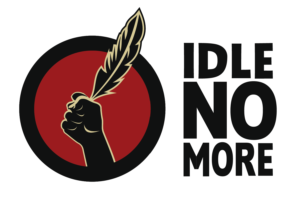Anishinaabe Water Walk just the First Steps towards Stopping Energy East – Idle No More
FOR IMMEDIATE RELEASE
August 10, 2015
Grassroots Water Defenders Pledge to Continue Fight to Protect the Water for Future Generations.
Iskatewizaagegan, Shoal Lake 39 First Nation—This past weekend, the Anishinaabe Water Walk against the Energy East Pipeline concluded its week-long, 125 km trek from Eagle Lake Lake to Shoal Lake in Treaty 3, Anishinaabe Territory, along the route of TransCanada’s proposed Energy East tarsands pipeline project.
The Walk included more than three dozen participants from more than a dozen different First Nations and non-native communities over the course of the week, including the Chiefs of two Treaty 3 First Nations, Chief Patricia Big George of Naongashiing, Big Island First Nation, and Chief Fawn Wapioke of Iskatewizaagegan, Shoal Lake 39 First Nation who was on the Walk for its entirety.
“Our Anishinaabe laws and values tell us everything we need to know about Energy East; that is why we say no,” said Wapioke.
Becca Mandamin, a community organizer from Iskatewizaagegan, suggested that the fight against the pipeline is just at its early stages. “It is important to walk against the pipeline, but we should also be openly opposing it in other methods as well,” she says.
While Grassroots Indigenous Water Defence (GIWD), the group that organized the walk is planning to continue to build its own grassroots education and engagement campaign, most of the participants were not GIWD organizers, but grassroots Anishinaabe people who all plan to carry on the fight against Energy East in their own ways, alongside coordinated efforts and campaigns.
“As a father to be, I do this to protect the waters for my families, to stand up against what harms them,” says Keegan Michael Lazarus Nepinak of Opaskwayak Cree Nation, a young Anishinaabe/Cree man who was one of about a dozen individuals who made the trip to join or support the walk from Winnipeg. “I don’t only walk for them, but also for the ones who cannot, because if the pipeline is completed, it will destroy more families than my own, so I will stand to fight for us all,” he says.
Grassroots Indigenous voices are rightfully becoming central in discussions about whether or not pipelines and other industrial resource extraction projects are allowed to occur. The education, empowerment and Nation building initiatives that are part of this dynamic are occurring on many different fronts, not solely by groups explicitly engaged in land and water defence.
ErinMarie Konsmo is a Michif/Nehiyaw woman from Lac Ste. Anne, Alberta, who joined the Walk along with three other members of the Native Youth Sexual Health Network (NYSHN), a grassroots network of Indigenous youth from across Turtle Island. Describing the link between the work of her organization, NYSHN and GIWD, she says, “Our bodies and sexual and reproductive health are intimately connected to what happens on the land.”
“Resisting the proposed Energy East pipeline that would cross many of our territories and the resulting impacts on our bodies, as a network, is Nation building,” says Konsmo.
Alexa Lesperance from Naotkamegwanning, another Treaty 3 First Nation, is a Youth Facilitator with NYSHN. She notes that, “Water is important in rites of passage, particularly the rites of passage of birth.” For Lesperance, “This water walk is an extension of rites of passage, because most people here are parents and have their children here,” she says. “The Water Walk is a rite of passage because you are modelling for young people what it is like to defend the land,” concludes, Lesperance.
The Anishinaabe Water Walk, which effectively spread awareness and built unity against TransCanada’s Energy East pipeline project, organized by Grassroots Indigenous Water Defence, was just the first steps towards assuring that it is the grassroots people of the Anishinaabe Nation who make the final decision for the Energy East pipeline and other industrial resource extraction projects occurring within Anishinaabe Territories.
-30-
Hi-Res Pictures attached, B-roll available
Contact: Alex Hundert, Media Liaison, Grassroots Indigenous Water Defence, 807 407 2417, grassrootsindigenous2015@gmail.com


